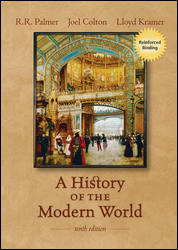 
History of the Modern World, 10th Edition (Palmer)Chapter 2:
The Upheaval in Western Christendom, 1300-1560Learning ObjectivesChapter 2 teaches students about:
The Renaissance in Italy, and the ways in which the cultural life of the Italian city-states influenced developments in the rest of Europe. |
 |  |  |
The new secular conception of life, and the replacement of collective responsibility by a new focus on individualism. |
 |  |  |
The humanists, their role in popularizing the vernacular and their forging of modern critical methods and literary styles. |
 |  |  |
The new political philosophy introduced by Machiavelli. |
 |  |  |
The Renaissance in northern Europe, in which religion played a greater role. |
 |  |  |
The new monarchs of Europe, who laid the foundations for the national, or territorial, state. |
 |  |  |
The dissatisfactions of the common people, the middle classes, and the rulers with the church. |
 |  |  |
Luther’s criticisms of the church, and social and political rebellions that Lutheranism provoked. |
 |  |  |
Calvinism and its commonalities and differences with Lutheranism. |
 |  |  |
The founding of the Church of England. |
 |  |  |
Catholic responses to the Protestant Reformation, such as the Council of Trent and the counter crusade. |
 |  |  |
The continued struggle between the papacy and secular rulers, which led the Babylonian Captivity, the Great Schism, and ultimately, the conciliar movement. |
 |  |  |
The Black Death and the social and political repercussions of the crisis. |
 |  |
|





